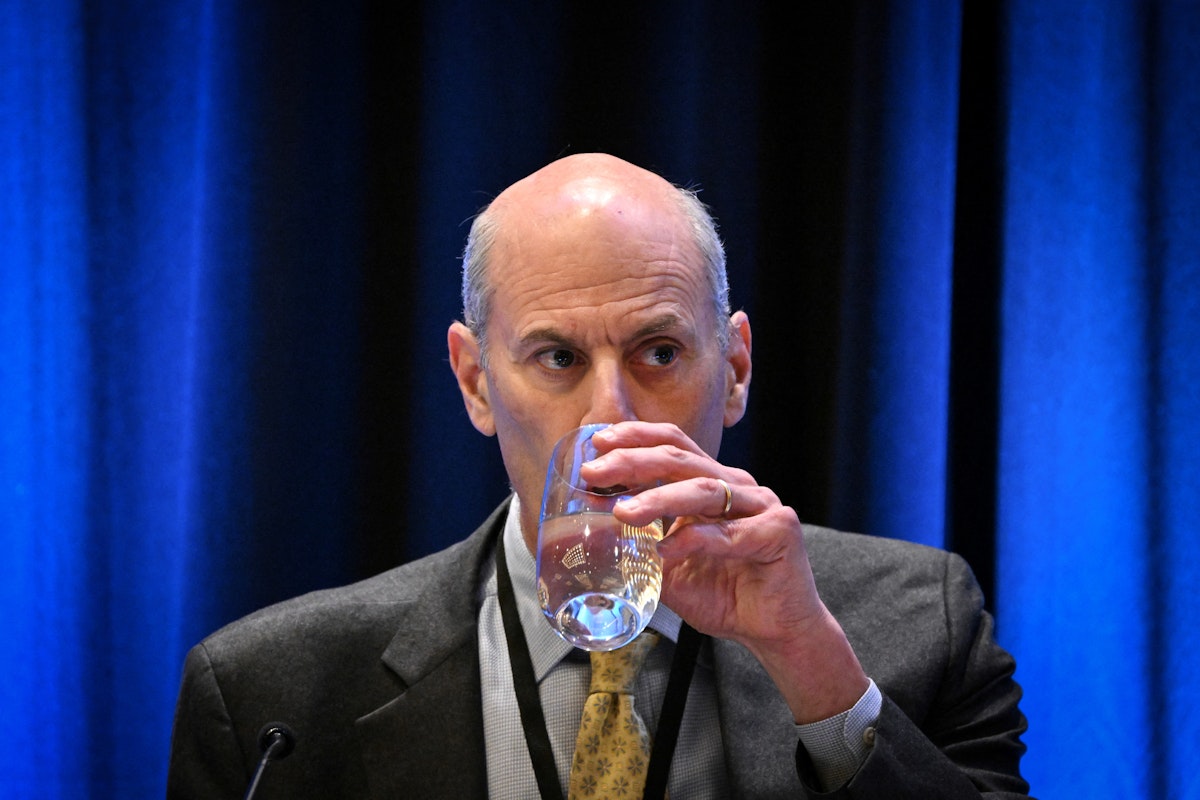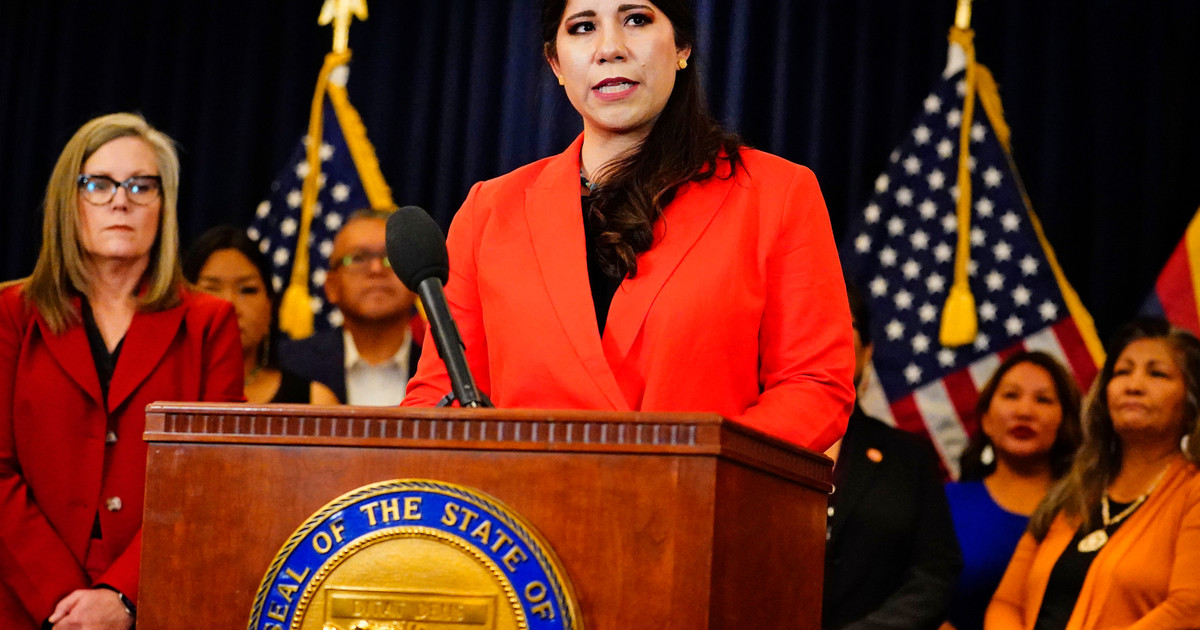ProPublica is a nonprofit newsroom that investigates abuses of power. Sign up for Dispatches, a newsletter that spotlights wrongdoing around the country, to receive our stories in your inbox every week.

In France, the Collective Denial of Islamophobia Is Deadly
May 2, 2025
Judges Who Rule Against Trump Become Target of New MAGA War
May 2, 2025The director of Arizona’s embattled Medicaid agency resigned this week, just as she was expected to face questions from lawmakers about her handling of a massive fraud scheme that largely targeted Native Americans.
Gov. Katie Hobbs, a Democrat, announced Wednesday that she had accepted the resignation of Carmen Heredia, director of the Arizona Health Care Cost Containment System. The governor lauded Heredia’s leadership of the agency while blaming Republican lawmakers for politicizing the confirmation process, saying it had become clear they would not confirm Heredia’s nomination.
Sen. Jake Hoffman, a Republican and chair of the Senate’s Committee on Director Nominations, said in a statement that in responding to the fraud scheme, Heredia had “poorly executed” the suspensions of hundreds of behavioral health providers. Heredia had served as the head of AHCCCS without Senate confirmation since early 2023, several years after officials say the fraud likely began during the Republican administration of former Gov. Doug Ducey. In the year before Heredia became director, records show that officials were warned that the fraud was harming patients, but they struggled to respond and failed to alert the public, which Heredia did along with other state leaders in May 2023.
(Earlier this year, a spokesperson for Ducey did not comment on missed opportunities to stop the fraud but said that the former governor went to great lengths to assist in Hobbs’ transition.)
Under Heredia’s leadership, AHCCCS withheld payment to more than 300 businesses as the agency investigated allegations that they were fraudulently billing Medicaid for treatment services. Often, the services had not been provided, and business owners were accused of allowing patients to continue the substance use they had hoped to overcome through treatment.
In a statement, Heredia said she submitted her resignation with a heavy heart and expressed concern that a partisan agenda had resulted in professionals being dragged “through career damaging hearings.” Two years ago, Senate Republicans derailed the nomination of one of Hobbs’ previous picks to lead the health department.
Last September, more than a year after the crackdown began, the Arizona Center for Investigative Reporting and ProPublica reported that the suspensions had rendered patients homeless. Victims of the scheme, some from other states, were also left without access to the drug and alcohol treatment they were seeking.
Over several years, businesses across much of Arizona, but mostly in Phoenix, reaped huge Medicaid reimbursements by enrolling Native Americans in their programs and billing the state’s American Indian Health Program at exorbitant rates for services, like counseling sessions. (The AIHP is a Medicaid insurance option that, until the fraud was discovered, had no set limit on the amount of money providers could bill for services.)
At a news conference Thursday, Attorney General Kris Mayes, a Democrat, said there had been more than 100 indictments and 25 convictions so far related to the scheme. She also said she expected more indictments to come.
AHCCCS said over the past two years that officials’ top priority was patient safety, and in May 2023, the agency set up a hotline for victims. It provided brief hotel stays for people displaced from shuttered facilities. However, AHCCCS said last year that it had no record of what happened to a majority of the hotline’s then 11,400 callers, largely because after six months it had stopped tracking outcomes for people who did not stay in a hotel. According to available data, more than 575 people ended up without housing as of last September. AZCIR and ProPublica also found that at least 40 Indigenous residents of sober living homes and treatment facilities in the Phoenix area died as the state fumbled its response.
A handful of the suspended providers, out of hundreds investigated, were allowed to resume billing Medicaid after clearing allegations with the state. But they said the suspensions still pushed them to the brink financially and upended their patients’ care, AZCIR and ProPublica found. As a result, Heredia’s swift and aggressive response to the crisis — which authorities said was needed to root out fraud and save lives — caused concerns that behavioral health care, especially for Native Americans, was increasingly difficult to access.
“Under Katie Hobbs’ leadership, Heredia’s response has been incredibly disturbing, to say the least,” Hoffman said. “We are left with a broken system due to Heredia’s mismanagement, and our vulnerable populations are caught up in this collapse.”
A spokesperson for Senate Republicans declined a request for an interview with Hoffman.
While Hoffman’s statement mostly focused on the fraud scheme that authorities say cost the state $2 billion, he said he also took issue with other matters within AHCCCS involving long-term care.
In addition to Heredia’s resignation, Jennifer Cunico, the director of the Arizona Department of Health Services, also stepped down this week. Like Heredia, Cunico was set to appear before lawmakers for a confirmation hearing. Cunico said she was proud of her work at the department but made the difficult decision to withdraw her nomination after it became clear she wouldn’t be confirmed either. Her resignation comes two years after Hobbs’ previous pick to lead the health department withdrew her nomination following a heated confirmation hearing.
Hoffman said Cunico had defended public health officials’ pandemic response during meetings with lawmakers but did not provide details. Hoffman previously sponsored legislation that prohibited state and local agencies from enacting vaccine mandates.
The governor defended Heredia’s response to the fraud crisis and said both Heredia and Cunico had worked on a range of initiatives, including improving access to maternal health care.
“Carmen Heredia helped root out a multi-billion dollar wave of Medicaid fraud and the related humanitarian fallout which the previous administration ignored,” Hobbs said in a statement. “Her work to eliminate waste, fraud, and abuse in our healthcare system is a model for the nation, and she always ensured people who needed help continued to get it.”
She added, “The Senate’s unprecedented politicization of the director confirmation process has ended the directorship of two healthcare professionals who have made our state government run more efficiently and more effectively.”
Christopher Lomahquahu, an investigative reporter and Roy W. Howard fellow for AZCIR, contributed reporting.
Great Job by Mary Hudetz & the Team @ ProPublica Source link for sharing this story.





